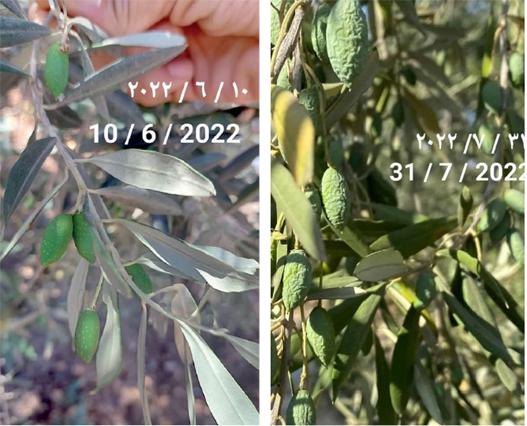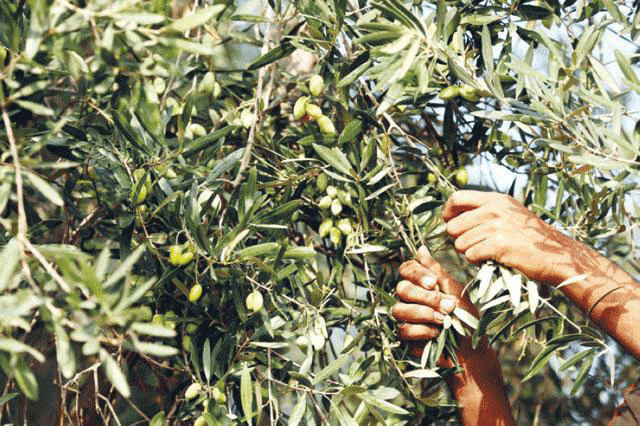You are here
Olives wither as climate change takes root — expert
By Rayya Al Muheisen - Jul 31,2022 - Last updated at Jul 31,2022

In this combo image, olives are seen before and after the recent heatwave (Photo courtesy of Murad Maitah)
AMMAN — Climate change and elevated temperatures impact the growth and development of olives and threaten olive oil quality, according to an agriculture researcher.
“Olive fruits are forecasted to wrinkle and change in colour due to increasing temperatures in the Kingdom,” Murad Maitah, a researcher at the National Agricultural Research Centre (NARC) and a professor of olive oil technology, told The Jordan Times.
Maitah added that the wrinkling will be temporary.
“Roots will not be able to absorb moisture from the soil; therefore, leaves will have the water intake needed by taking the humidity out of the fruit, resulting in a wrinkled olive fruit,” Maitah said.
This process happens to keep the inner tree eco-system balanced, he added.
Maitah noted that olives will plump back up again after watering. “The wrinkling will not ultimately affect the quality of the fruit,” he said.
Farmers are advised to water their olive trees and apply potassium rich fertilisers, Maitah added.
He noted that the optimal time for watering would be either before the sunrise or after the sunset. “Water will not evaporate at these times,” said Maitah.
The researcher expressed hope that the current heat wave would not affect this year’s harvest.
For Abu Seif, a farmer, olive harvesting is his main source of income.
“Harsh climate and extreme temperatures make it harder for olive trees to grow and bear fruit,” Abu Seif told The Jordan Times in a recent interview.
According to Abu Seif, the erratic rainfall patterns the Kingdom witnessed this year during the olive flowering season will affect the quantity of the harvest.
“I use a non-irrigation growing method because it is more feasible and offers better olive oil quality,” said Abu Seif.
Abu Seif said that irrigation is not feasible for many of the olive cultivators due to lack of water as well as the increasing expense of water tanks.
Olive trees cover 72 per cent of the agricultural land in Jordan, according to the Department of Statistics (DoS). Approximately 10.5 million olive trees are planted over 560,000 dunums, most of which are located in the northern region of the Kingdom. Jordan is also ranked 8th internationally in olive oil production, according to DoS data.
Related Articles
AMMAN — Although Jordan is among the top 10 olive producing countries in the world, farmers are claiming that extreme weather conditions are
The olive fruit fly can pose a threat to the olive crop unless farmers take precautionary procedures to limit its negative effects, the Ministry of Agriculture said Wednesday.
AMMAN — A source of income for thousands of Jordanian families and a sizzling commodity present in all households across the Kingdom, olive














